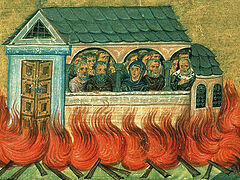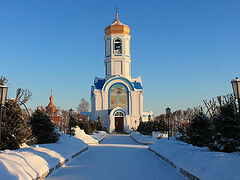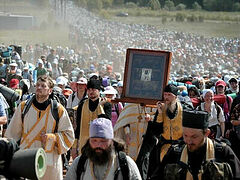We talked with the head of the Orichi Church Deanery, the rector of the Holy Trinity Church of the village of Bystritsa of the Kirov region, Archpriest Nikolai Fedko, about the history of the Bystritsa church, the Christian attitude towards miracles, and how to fast properly.
The time of spiritual formation
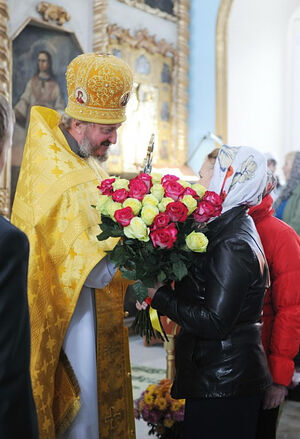 Archpriest Nikolai Fedko. Photo: Vyatskaya-eparkhiya.rf —Father Nikolai, tell us how you came to the faith and chose the path of church ministry.
Archpriest Nikolai Fedko. Photo: Vyatskaya-eparkhiya.rf —Father Nikolai, tell us how you came to the faith and chose the path of church ministry.
—I was born in 1967 in Ukraine to a peasant family. I was baptized in infancy. Every Sunday, our parents dressed up the children in their best clothes, and the whole family went to church. Once, when I was seven years old, a priest gave me a censer to hold during a service. It impressed me so much that from then on, I was especially drawn to church and came to love services very much.
After the army, I needed to settle down. There were many desires peculiar to youth, when it seems that the whole world is open to you, but the priest blessed me to go to my cousin, also Nikolai Fedko, who at that time served as rector of the Holy Trinity Church in the village of Kstinino in the Kirov region. I was twenty-two at the time. Arriving at Vyatka,1 I saw magnificent churches. The churches in our homeland were beautiful, but small. The grandeur of the cathedrals of Vyatka was breathtaking.
Soon after talking with me, Fr. Nikolai introduced me to Vladyka Khrisanf,2 who blessed me to perform the obedience of an acolyte at St. Seraphim’s Cathedral of Vyatka.3 In May 1990, I was ordained as a deacon, and on July 1 of the same year, I was ordained as a priest. The time of my service at St. Seraphim’s Cathedral gave me a lot for my spiritual development. There I met some highly esteemed archpriests—Herman Dubovtsev, Seraphim Isupov, and Simeon Petrov—who taught me spiritual lessons for life. These were very experienced people who had gone through persecution for their faith under Khrushchev. When in 1990 with the blessing of Vladyka Khrisanf I was leaving for Bystritsa, they told me, “Love the church and people will love you.” And from that time on, I have been performing my pastoral duties at the Holy Trinity Church; and these words became a blessing to me.
My wife has always helped me in my ministry. Maria sings in the choir. Raising two sons together, we have made every effort to make them Christian believers. Now one of them helps at the altar, and the other is a bell ringer. So far, they have chosen different professional paths, but it will by no means affect their confession of faith in God.
The eighteenth-century Holy Trinity Church, and the well-known priests
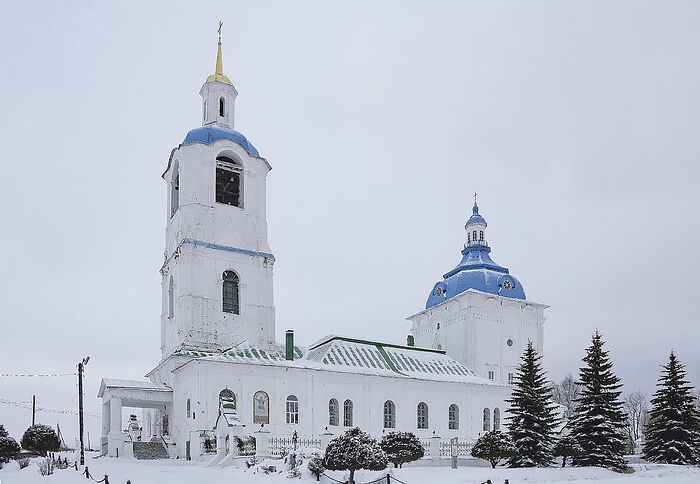 Holy Trinity Church in the village of Bystritsa. Photo: Ru.wikipedia.org
Holy Trinity Church in the village of Bystritsa. Photo: Ru.wikipedia.org
—Tell us about the parish of the Holy Trinity Church in Bystritsa, where you are the rector. What is the church notable for?
The Holy Trinity Church, built in the second half of the eighteenth century, is unique in that it was not closed even during the Soviet era; therefore, it has preserved much of its external and internal decoration, such as the ancient iconostasis. And it is important because everything here reminds us of the people who lived here before, about their faith and prayers.
Some priests whose names are known not only in our diocese but also nationwide served at the Holy Trinity Church. Father Mikhail Tikhonitsky (1846–1918; feast: September 20), who was canonized as a new hieromartyr, served here for several years. His relics now rest at the Church of the Nativity of the Theotokos in the town of Orlov. At one time, the rector of our Holy Trinity Church was Priest Viktor Kostin who, after becoming a widow, became a monk with the name Sergius. He was consecrated bishop and headed the Kostroma Diocese for the last three years of his life, until June 1959. Archimandrite Seraphim (Sutorikhin), who suffered for his faith in the Soviet era and served terms in the Svir and Pechora (the Republic of Komi) labor camps, was the rector of our church in the 1940s. He continued to communicate with his flock in Vyatka, and until his death in 1979, he served in Samarkand (Uzbekistan), where he was buried. Now, materials are being collected for his canonization. Archpriest Konstantin Gulin, who fought in the Great Patriotic War [WW2], devoted his whole life to our church, defending it during the hard times of Khrushchev’s persecution. Thanks to Batiushka's wisdom and patience, the church was preserved and the faithful were united.
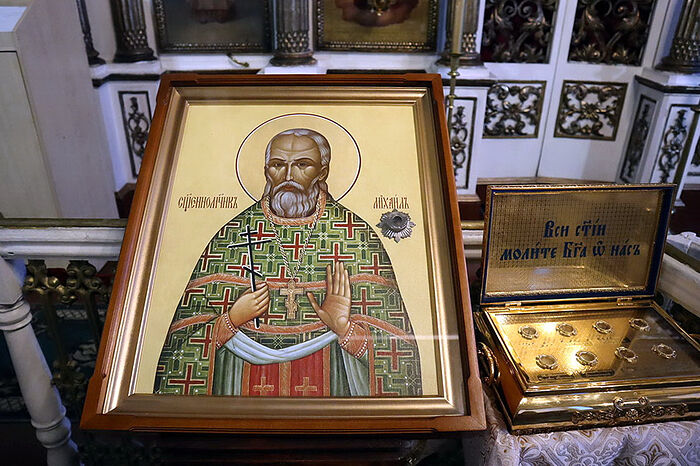 Icon of the holy New Hieromartyr Mikhail Tikhonitsky
Icon of the holy New Hieromartyr Mikhail Tikhonitsky
The life of the parish as a living body is filled with both joys and sorrows. People with different views and complicated destinies come here. It is gratifying that the Lord, Who wants everyone to be saved, leads them to Himself.
In recent years, with God’s help, we have managed to do a lot. The whitewashed church has acquired new domes with crosses, the floor has been replaced, and gas heating has been connected. None of this is my merit—if God has given you something, He can take it away. I would like to thank everyone who has ever helped the Holy Trinity Church in any way, and wish them good health. Metropolitan Mark (Tuzhikov)’s care for our parish and the people working here is invaluable. Vladyka shares his spiritual experience with us, giving us practical advice on how to best beautify the church. We follow his blessings and then rejoice in how the church is being transformed.
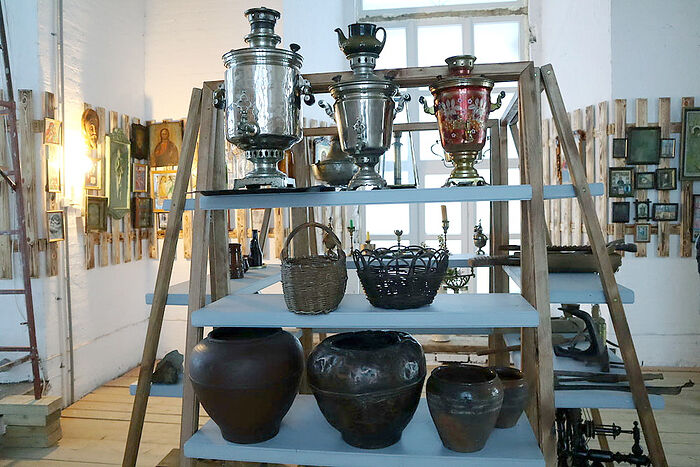 The museum on the church bell-tower
The museum on the church bell-tower
Is it impossible to have faith without miracles?
—Have miracles occurred in your parish? Do you have any wonderworking icons at the Holy Trinity Church?
Actually, all icons are wonder-working. But is it impossible to have faith without miracles? Sometimes, in search of miracles, people pass by God. And there are many miracles around us. Every day is a miracle. Our church was never closed under the Soviet regime.
Even in the toughest years, there were people who took care of the church, contributing their mite to its repair, heating, and lighting. Thanks to their labors and prayers, the church has survived. This is also a miracle that we underestimate.
A priceless gift
—You began your priestly ministry in the 1990s. How do you think believers of that time differed from modern ones?
—In the 1990s, when religious freedom was declared, many new parishioners appeared in churches. On the one hand, faith became something new, revealing the mysteries of the spiritual realm; on the other hand, the souls felt a return to our roots, to the faith of our ancestors. It was a time of hope and spiritual enthusiasm, which has unfortunately since gradually faded away for many.
Now that churches are open and services are celebrated, it is sometimes very sad to see that people who call themselves Orthodox do not value this priceless gift—such intimate and living communion with God. Let’s admit that modern parishioners have gotten used to how merciful God is to us, and they are slack. We suffer from spiritual blindness, we do not see our sins and our spiritual poverty, and therefore we do not wholeheartedly seek “the one thing needful”. We fail to understand how close the Lord is to us and what bliss it is to be with Him. And in order to regain spiritual sight we should examine our consciences more often and ask God with the words of the Prayer of St. Ephraim the Syrian, which we will often read at services during Lent: “Lord, grant me to see my failings!” After all, sins are the root cause of our sorrows and the wall that we build between us and God, and only profound repentance can destroy it.
God’s mercy
—Does the Lord forgive a person every sin? How do you feel that God has forgiven you?
—If we have sincere repentance the Merciful Lord forgives our sins, but He also waits for us to reform, urging us not to return to sin. We should remember that the word “repentance” comes from the Greek word “metanoia”, which means “change of mind”—that is, a change in your way of thinking and whole life, and separating yourself from sin. That’s what true repentance should be like! How can we feel that God has forgiven us? A living soul will certainly feel this, having received the peace that only the Lord can give.
I think that an indirect confirmation of God’s mercy to us, to all mankind, is that the Lord prolongs our days on earth. God is love, not punishment. He does not tear off our arms and legs for our countless sins, but out of His love He is longsuffering towards us, forgiving us and expecting us to love Him in return.
To find a way out with God
—Why are people sent various trials—for example, a long pandemic that they had to go through? Man was created to be happy.
We constantly forget about the Lord, even betray Him, filling the emptiness of our souls with something else. However, we do not find peace in this. And God still waits, believing in us. In His all-surpassing wisdom and incomprehensible love, the Lord even allows us to experience sorrows, trials and illnesses (the consequence of our sins), trying to bring us to reason, to bring us back to the fullness and joy of life with God, where true bliss is hidden for us. After all, man was created to be happy, not to suffer. But sin, especially pride, moves us away from God, turning Paradise into hell.
Look at how arrogantly modern humanity declared how “strong” and “smart” people are: they created a “perfect civilization”, entering a “digital age of new technology”… But take the recent pandemic: it revealed how helpless and defenseless we really are and how fragile our civilization is if it was built on sand.
Let’s not grumble at the difficulties that have befallen us, but try to overcome them, finding a way out together with God. If we manage to change our lives, getting rid of the superficial and unreal things that darken the image of God in us; if the Lord takes first place in our lives and we try to walk towards Him on the Christian path of love, then any difficulty can become a new step of spiritual ascent for us. But if we continue to look for a way out without God, we will get lost again.
Spring for the soul is ahead
—Lent is not far off. What is the right way to spend this period with benefit for the soul?
—This topic is very extensive. Much can be said about how to fast both physically and spiritually, about the importance of attending special Lenten services, about penitential prayers and prostrations, about making up with our loved ones, and about good deeds for Christ’s sake… Everything should be done with wisdom, to the best of our abilities, while taking into account our age and life circumstances. The most important thing is that these days should be spent in prayer, humility and love.
Then Lenten labors will benefit our souls, help us get closer to God, and soften our hearts towards our neighbors. All of this requires persistence, patience, and even determination. But it happens that people seemingly want to fast, they know that Lent is spring for the soul, and this period is very joyful and not mournful, but they immediately refuse, justifying themselves: “How can we get through it? It’s not for us!” And they do not even try to start fasting. Sometimes it is vital to take this step and gain personal experience of fasting so that later we can share it with others. After all, we will need to strengthen our children and grandchildren in the faith. And the reward for us, who have labored spiritually and physically in the Lenten period, will be the gracious joy on Paschal days that the Lord gives to the hearts of those who seek Him.

